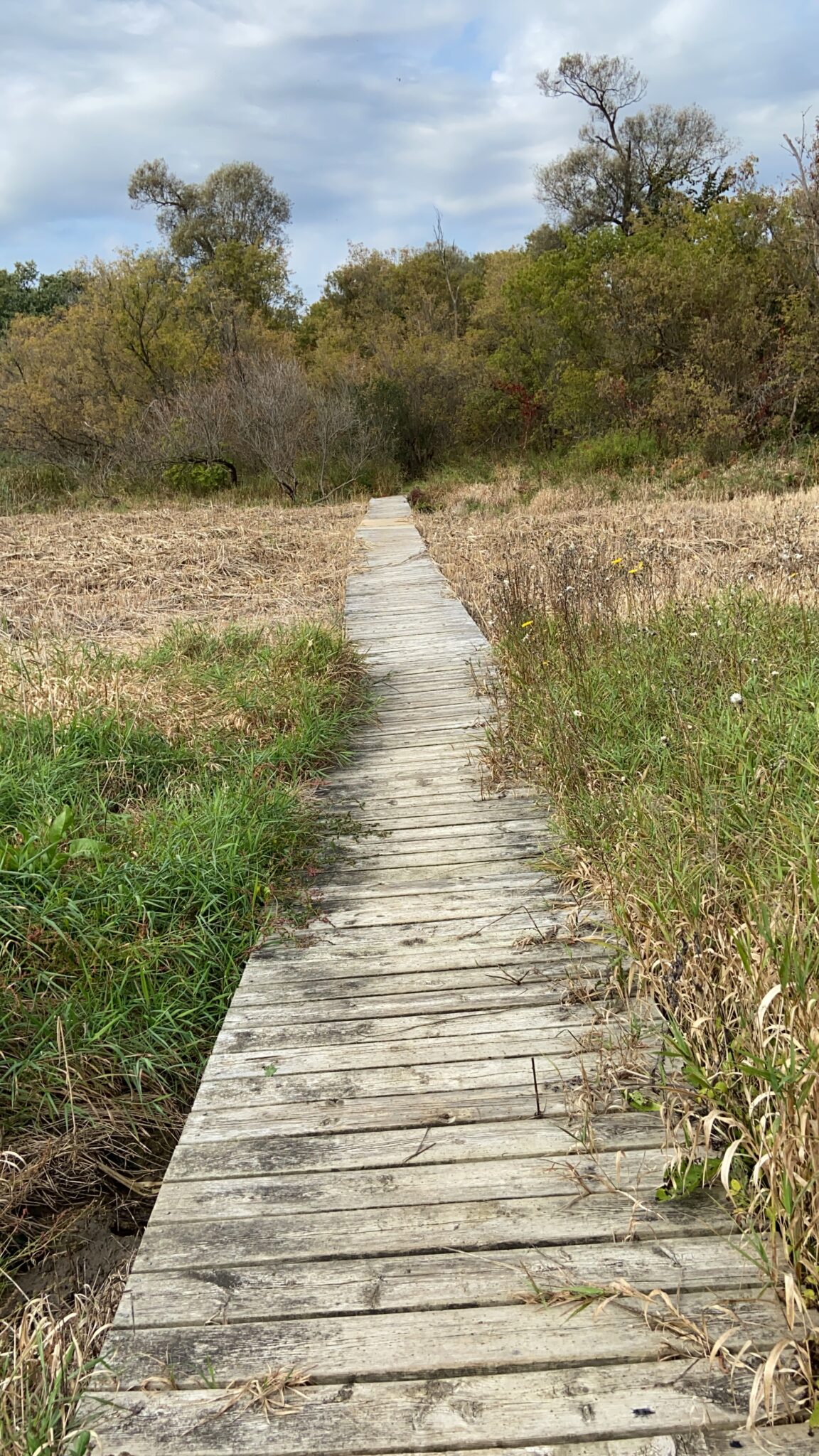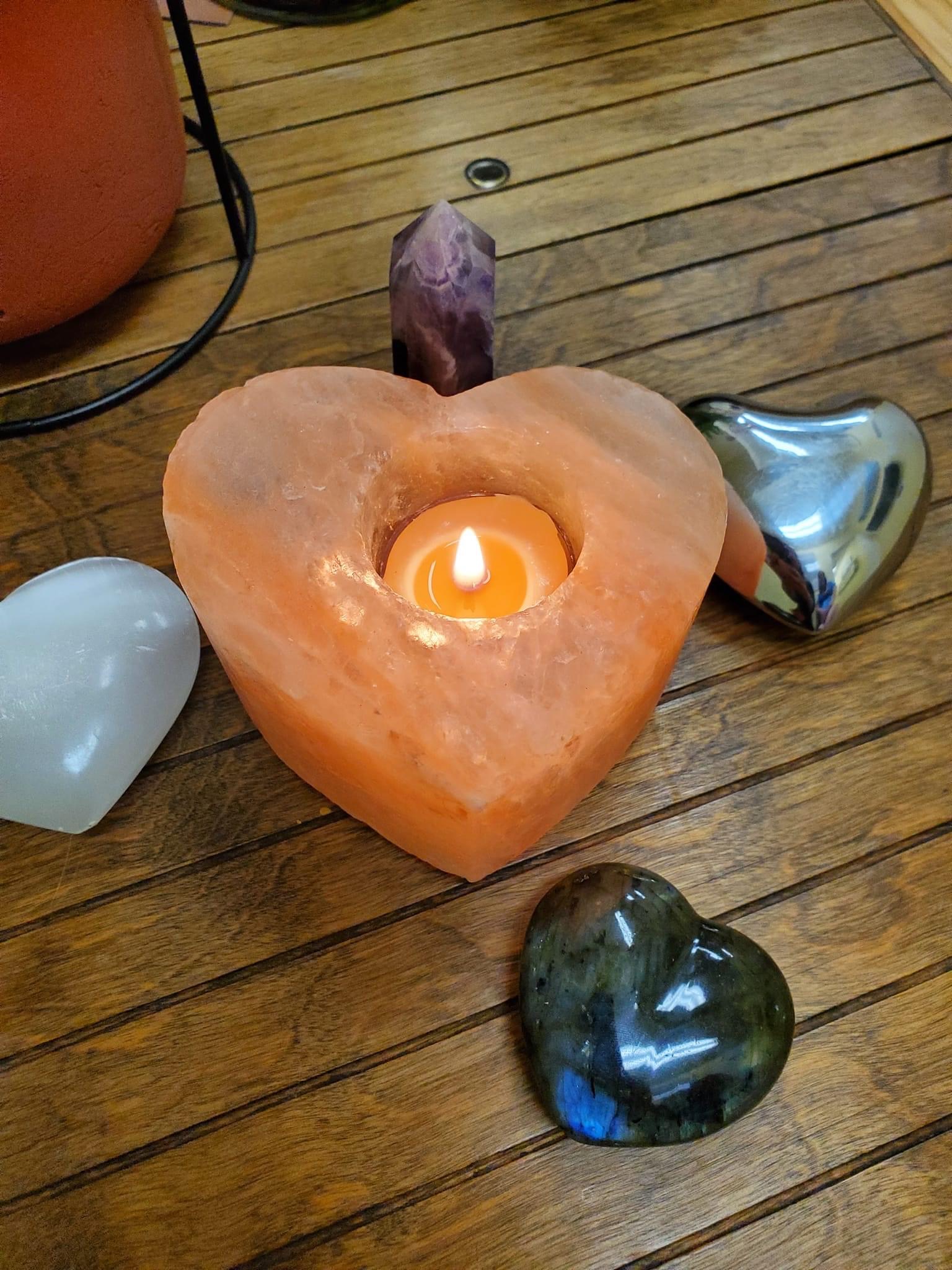Posts Tagged ‘Grief’
Learning from Grief
By Noelle Bailey
Grief is weird. Odd start, I know, but that was the sentence I used a lot whenever someone asked me how I was. It was never a constant feeling; it changed day to day. And still does. It’s the full gambit of emotions from sadness to anger to guilt and, though dark, even humour found its way in.
In December of 2019, I lost my father. His health had been declining for several months, and we had started the process to diagnose and begin treatment for what we knew was probably cancer. At his first appointment with his oncologist, he was immediately admitted to the ER. By the next day he was on a ventilator, and within twelve days they came to tell me that the cancer had spread everywhere. We had lost a fight we hadn’t even really begun. In March of 2022, my mother passed away after a 14 year fight with MS. It was a much different process to lose her by degrees over those 14 years, witnessing her own body turn against her while powerless to do anything to stop it.
Those are my two experiences with the strangeness of grief. They were vastly different experiences, but also similar in that they cut me in two and changed my life.
The two biggest things I’ve taken from my grieving process are these:
1. I will, for the rest of my life, miss the conversations we will never have. There are books I’ve read since they left that I would love to talk to my mom about. My dad never got to hear about my new job, and he would have loved it. Pictures people have brought me that I can never ask them about, stories I missed out on hearing. The moments of my life, big and small, that they won’t be here for is the part that takes me under every time.
2. I can grieve however I need to. It doesn’t need to look a certain way or be anything other than what I need. I struggled a lot after losing my mom with the idea that I wasn’t sad enough or broken enough because after watching her long hard battle there was a certain peace lacing itself through the pain. When we laid my parents to rest in the cemetery next to my grandparents, we played “The Rainbow Connection” sung by Kermit the Frog because that’s what my mom had always said she wanted to play to say goodbye. Then my husband, Cale, and I did a shot of Jack, like my dad and Cale did when they went out for my dad’s 60th.
I’ve never been very good at setting boundaries in my life, but I tried very hard to make sure I set them surrounding my grief. To let myself do whatever I needed to process the loss of my parents and not to let anyone tell me I should be acting or feeling a certain way. I laughed at things they would have laughed at, and when I needed to, I cried. I am slowly learning how to live in a world without my parents, and know that I will be for the rest of my life.
There One Day and Gone the Next : Art Therapy and Grief
By Sarah Smith DTATI, BFA
Over the last 12 years or so, I’ve had the opportunity to work with those grieving individually and in group settings, which has provided me with experience and insight into how art therapy (and art as therapy) can be beneficial to those dealing with loss.
What is Art Therapy?
“Art therapy combines the creative process and psychotherapy, facilitating self-exploration and understanding. Using imagery, colour and shape as part of this creative therapeutic process, thoughts and feelings can be expressed that would otherwise be difficult to articulate,”(CATA, 2022).
There’s no right or wrong in art therapy, it’s a matter of using the art as a vessel for wellness along side a trained professional. There are many benefits one can receive from engaging in the art making process such as: healthy coping strategies, insight, emotional stability/balance, stress /anxiety reduction, grounding of emotions, pleasure/joy, creativity, safe space, expression, control, freedom, and connection among many others!
Art Therapy and Grief
Grief is a very layered and challenging thing that is unique for each individual who experiences loss.
Because there is no “proper” way to grieve, art therapy can make for an excellent coping strategy as it allows for each person to express themselves in the way that’s best for them.
Unlike traditional “talk therapy”, art therapy has the art, so this means that one does not need to speak if they don’t want to or if they cant find the way to articulate how they feel into words. Sometimes, while people are grieving they cant even pin point how they feel and at other times the emotions can just be so overwhelming it can affect one physically and to try and talk about the emotions just exacerbates them.
Creating art in itself can be a healing thing. It can be a fun or relaxing thing to do. Engaging in an art therapy session can allow for so many more benefits. The art therapist can provide the participant with specific art therapy directives and art materials that they feel may be beneficial to your needs. Art therapists are trained to read and assess clients’ artwork. This means they may see things you may have missed that you might benefit from if brought to your attention. This insight makes it a great learning tool for self-discovery. We as art therapists believe that the art work holds the subconscious. What’s great about this for those who are grieving is that people can process however they need to. Some people need more time to process, some people need a more gentle approach where they feel in control, some people refuse to acknowledge things, and some people are just going through the motions and engaging in the art making process. The subconscious is purging and the healing is happening whether they realize it or not.
Art Therapy Directives (examples)
I facilitated a workshop at a hospice a couple years ago and offered it to those who had lost a loved one. The workshop began with a few art therapy warm-up exercises with the intention of helping everyone feel a bit more comfortable in the space and with each other.
The first art therapy directive I had them do was make flowers out of coffee filters, markers, and water. I wanted them to make something symbolic for their loved one. They began by writing whatever they wanted onto the coffee filters. Some people wrote the persons name, poems, a memory, or even drew a picture. They then watered down the filters and the colours began to bleed. Some people cried during this part. They could resonate with the symbolism. The water like tears. The bleeding of the colours representing pain, fuzzy memories, and a distant grasp on the person. When the coffee filters had dried we had turned them into flowers. The transformation of taking what we lost and carrying it forward in a new way was very powerful to witness and a very healing thing to say the least.
The second art therapy directive was focused more on the individual rather than the deceased. I gave everyone a mask. I instructed them to paint the front of the mask how they appear to the world and I asked them to create on the inside of the mask to show how they really feel or how they are actually doing (see figure 1).
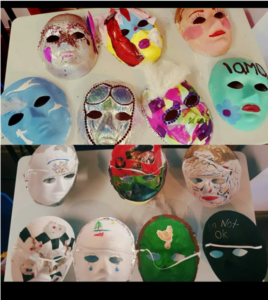
Figure 1.
They shared their art work from the workshop, but it was heavy. They were feeling sensitive and tired among other feelings so I had them sit and talk for a bit and then had them pull a self-care card for a distraction before letting them and drive home, as it may not have otherwise been safe for anyone overwhelmed after such an engaging session. This is typically how I run a grief workshop. Before they left the hospice asked them to fill out a score sheet to see how they felt about participating in the workshop and everyone said they liked it and for reasons, such as that they felt less anxious, they felt less alone, the felt lighter and more hopeful after the workshop.
At another hospice art therapy workshop, I had them create memory boxes. I provided them with a wooden box along with a variety of art materials, the only thing I asked was that they brought in a picture of the person they had lost. The purpose of this was to give them an opportunity to create something that could hold two energies, a place to honour them deceased, but also something tangible for them to have and hold. From my observations, I remember them taking a lot of time on these boxes and they were very quiet while making them. When they shared them, they were emotional, of course, but pride came through, it was like they made them for their people and wanted to make them well, so that their loved one would really like the box. This made them feel good for reasons such as honouring the person still while they are gone. Some people felt that their guilt had been eased a bit because they were physically doing something for that person who was no longer here. To see an example, see figure 2 and 2b.
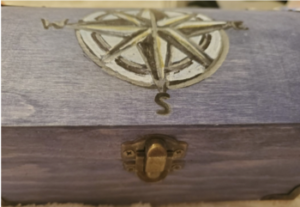
Figure 2
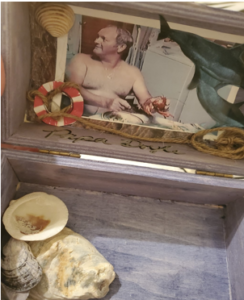
Figure 2b.
Following the memory boxes, I had them paint a step by step painting for their loved one. This was more of an art as therapy approach. This means they were literally using the art itself for wellness. They followed along with me and painted a whole painting. By following me, they were able to safely let go and get lost in the art making process. The intention was to enjoy the process while also giving them a healthy mental and emotional escape for however long it took us to paint the picture. I selected a picture of trees that had no leaves, purposely to symbolize letting go, loss, and reflection but the painting had an element of hope to it, the tress were pointing up to the sky, facing the light and there was lots of colour (see figure 3).

Figure 3.
The photos below are some examples of art from some of my sessions with clients around grief. They speak for themselves.
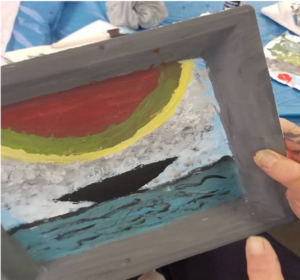
Figure 4.
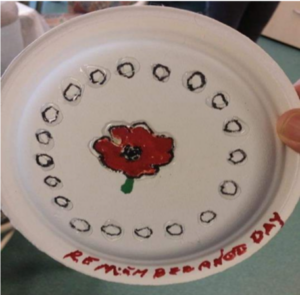
Figure 5.
Grief Literacy and Developmental Disability
By Carrie Batt, Grief Educator
Grief literacy has become a popular topic, yet it is a topic that is untapped within the disability community, specifically within the developmental sector. The sector supports and empowers people with a developmental disability and consists of families, their loved ones and service providers.
Within the sector there are very few conversations, education, or shared expertise about grief, loss, and disability. The pandemic brought to light the sheer lack of education and support that exists about grief, loss, and disability. My way of dealing with such a realization was to try to make a small change, which began by forwarding a proposal to my employer, requesting that we offer grief literacy sessions. The proposal was accepted, and we successfully offered four 1-hour grief literacy sessions, which reached a total of 20 participants. What we learned in offering these sessions was the value of learning new language to help in expressing and describing their grief experiences as, often, people with a developmental disability have grief stories that so often are unacknowledged and go unnoticed. Their grief histories are often extensive, and very painful. The painful history of the grief experienced amongst people with a developmental disability that begins with the atrocities of the institutions, the Huronia Regional Centre, The Ontario Hospital School, and The Orillia Asylum. The magnitude of such grief and loss has only recently been made public.
There is such an enormous amount of grief and the loss that until recently was unnoticed. Such unacknowledged grief within the developmental sector is far more common than ever imagined, especially when we include that of our direct support workers. Currently their grief is unheard of. Consider for a moment, supporting someone for ten years in their home, and when the supported person dies, cleaning out their room to prepare it for the next person to move in, and doing so without any recognition of your personal grief. Such scenarios play out daily within our developmental sector and just being expected to carry on with the work is the norm.
With that said, the reality remains that the developmental services sector can only benefit from receiving support and guidance from the bereavement support services sector. Such a partnership would help to bridge the gaps and begin dedicating resources towards, training education, and understanding about grief, loss and disability.
Grief and Parenting in the Disability Community
By Carrie Batt, Grief Educator
Parenting is complicated as it has so many twists and turns. There are a variety of parenting styles such as hovering, free and easy, and everything in between. The one thing parents have in common is the fact that parenting never ends, thought it changes. Many parents can look forward to their child changing as they age and gain independence. Parents often look forward to and are proud of their child leaving the nest. Yet for many parents with children who have developmental disabilities, that is not the case. These parents must offer unwavering support, care, and guidance to their child or children who live with disabilities.
These are parents who are relied on in various ways, being the primary caregiver and managing everything. Some parents aging into their 70s, 80s, and 90s remain the sole primary caregiver to their child. Their day-to-day parenting tasks have never ended as their child has grown into adulthood. In fact, for some, their parenting roles increase as their child ages and may begin to lose daily living skills, develop early-stage dementia, show signs of aging or illness, begin to regress in specific areas or require much more support. Some parents must also cope with the fact that their child may be experiencing mental health issues in combination with a developmental disability. This is a most unique parenting experience as it is all-consuming. Such parenting speaks to a level of commitment and unconditional love where unwavering support is a constant.
In conjunction with these realities, there are times when such parents become a part of the end-of-life and palliative care communities. Once their child with a disability is diagnosed with a life-limiting illness, the only choice is to navigate end-of-life care, and there is no road map for what these parents will be embarking on. When it comes to death, dying and disability there is no education or expertise readily available. The same is true for grief, loss, and disability. Currently there are few disability-sensitive supports for such families who are having to transition from being the primary care giver to preparing for the impending death of their child.
The grief surrounding these realities have yet to be spoken of or integrated into the bereavement services and are rarely acknowledged within the developmental sector. The same is true of the reality faced when a child with a disability must face to mortality of their parents and primary caregivers, as for many of these children they may never have left the family home.
This is a type of grief most cannot imagine. This type of grief has not yet been recognized, validated, and honoured. There has been no space made within our grief support services that speaks of the magnitude of the grief surrounding these families. My hope is that the light can shine to meet these needs in the developmental sector for the families we serve.
Grief and Disability: Carrie’s Story
By Carrie Batt, Grief Educator
My son says I am a mover and a shaker. He tells his friends that because of my extensive travels abroad and my volunteering. When his friends ask: “Why did she do that?” he always tells them “Because my mom believes that ‘anything is possible’.” As I look back on my journey, I know where I picked up this motto. When my baby brother was born, the doctors told my parents: “he will not walk, talk, nor know who you are”. From that day on my parents embodied that motto ‘anything is possible’ and in the end my brother does far more than walk and talk. This circumstance introduced me to the disability community knowing that people with disabilities deserve and can do more. Interestingly, I have had the privilege of working within the developmental sector in a variety of positions for more than thirty years.
In 2018, I added to my parents’ motto ‘anything is possible’ and included ‘everyone is worth it’. I added those words to the motto right after I had attended a kintsugi workshop offered by Rami Shami, a prominent member within the deathcare community. As soon as I realized that Rami had spent the last 30 years caring for the dying. I inquired about his experience in death, dying and disability. Rami unfortunately, had no experience in supporting people with a disability who were dying. Upon learning about the sheer lack of support and expertise on this topic, I proceeded to complete the end-of-life training with Beyond Yonder Community Deathcare program. Soon after, SEOL Care was created, which offers a disability-sensitive approach to death, dying, and disability.
It has become clear to me over time that we have much work to do to ensure the delivery of disability-sensitive grief literacy and grief support. In March of 2022 my proposal for four 1-hour sessions was approved, we provided the program for 20 participants. My heart was full in each session.
My heart remains full of hope that conversations, education, and expertise about disability sensitive end of life care and grief support will gain momentum as more and more people join in on this vital conversation.
Currently, there are several rays of hope that suggest grief education and support can and will be offered in a more inclusive way. As a certified grief educator, I now offer online disability-sensitive grief support services for individuals and groups. My employer is offering disability-sensitive grief literacy sessions. The Bereavement Ontario Network has shared information through their newsletter and in a network webinar, where the gentleman I support and I were the guest speakers. Bereaved Families of Ontario have been receiving multiple requests to provide grief resources for the neurodivergent community. Additionally, Bereaved Families of Ontario are seeking out speakers with lived experience related to grief and under-represented communities for their grief literacy series. I remain grateful knowing that these are hopeful times, and these examples are a positive step in the right direction.
Birthdays, Anniversaries, and Other Special Days
Rachel Herrington – Social Service Worker Graduate, Third Year Psychology Student, Equal Rights and Community Advocate
It has been 10 years since my grandmother passed away and it never fails, every year leading up to her birthday I spend weeks with a pit of sadness and remorse in my stomach. I spend my days feeling this way and not understanding why then something makes the date catch my eye and it hits – It’s her birthday.
When we are grieving, some days are more difficult than others. Grief comes in waves like the sea and can feel like an intertwining labyrinth of emotions. Birthdays, anniversaries, and special dates that are associated with our loved one who has died can contribute to more emotionally intense days which can be worsened through the anticipation and “what ifs” of the upcoming day. These difficult days can leave us feeling defeated and it can almost feel like we’ve taken two steps backward in our grieving process, but grief does not have a timeline, and these feelings of setbacks are opportunities for healing.
Before the Day:
Communicate and set boundaries with others – think about how you want to approach the day and share your wants, needs, and desires with others. Clearly communicating your wants and needs with others will allow the opportunity for you to set the expectation for the day which can help relieve the intense feelings of anticipation.
Remember there is no right or wrong way to celebrate special days – It is important to remember that there is no right or wrong way to grieve and there is no written code or rule on how these special days are to be approached. However you decide to approach the day is the right way.
On the Day:
Allow yourself the opportunity for space from others – it is important to allow there to be an opportunity for you to step away and have a safe space to feel your emotions if you need to. If you are attending someone else’s home for the occasion plan a way that you can step away or leave with ease if you need to.
Find something that grounds you when intense emotions arise – if intense emotions are arising it can be helpful to find something to help ground you in the moment. This could be a physical item such as a small trinket in your pocket that you can hold, squeeze, and focus on in your hand, or it can be through positive mental imagery, deep breathing, and/or stress relieving acupressure, etc.
Take deep breaths – practicing deep breathing can help reduce stress and can increase resiliency during highly emotional or stressful situations.
If things don’t go as planned, that is okay – grief is a process with no timelines or set of rules, and sometimes things do not always go the way we plan and that is okay. Allow yourself time, patience, and understanding while you adapt to living with your unique grief experience.
When Death Feels like a Thief
By Amanda Sebastian-Carrier.
Amanda Sebastian-Carrier is a communications professional who writes about her grief journey as a form of healing.
Thief!
Oh, how loudly I’d yell the words, shaking my fist at its back as it ran from me through the crowded bazaar. You would find me, soaked in tears, panting and crying and trying to explain that something very precious had been taken from me by that, that, THAT THIEF!
In the heart of my grief, at my frailest, all I could see was what was no more. I grieved all that was stolen from me by death; love, security and even my very self. Had I known the value of having every pocket of who I was, picked bare by grief, I would not have fought so hard to hold onto it all. I’d have let that cutpurse have it all without raising an alarm. That egg, it could take the golden globs of joy, the silvery wisps of laughter and the precious stones of delight that once filled my world and sell them all to the highest bidder. How could I have seen the faceless bidder, behind their paddle, was me. Grief, that panderer, was only taking from me what I could not currently carry and would sell it back, piece by piece, as the currency of healing was paid.
If only I’d had a clue that the larceny committed by grief was not the crime I was reporting, I’d have stopped much earlier. Before death, I had no idea that the theft of all you knew and love and the process of reclaiming your sense of security and self were a process that had the ability to change your life forever, but not how you might think. Grief and mourning can lead to healing if you do the work. If you don’t waste time filing reports to the universe about the misappropriation of your loved one. If you immerse yourself in the process of mourning, instead of decrying the looting of your life. If you truly, honestly, and mindfully, say goodbye instead of trying to hold on. If you can do all that, the only thing that grief is able to steal is your pain. You just have to be willing to give it up, let it be taken.
It’s only now, after I have made my peace with the plundering pirates of grief that I can see what I saw as theft, was actually a gift. The thief that is grief was not stealing all that was happy and good in my life, it was stealing my pain. Grief sat on me, taking all the things I didn’t know how to process, and filtered them through different lenses. It sat with me, taking from me each tear that fell, each shaky breath and each battered heartbeat. Grief took all I had, each story, each memory, and each emotion from me until I began to have room to process life again. Grief took, not a life in the way death had, but death; out of the way of life. Death stole life and grief; grief gave it back.
Weathering the Intense Emotions of Grief
Post by Maureen Pollard, MSW, RSW
Grief often comes with powerful, unpredictable emotional shifts that can be painful to experience. While it’s important to find ways to sit with these feelings, to acknowledge the pain of grief and accept loss, it’s also necessary to find ways to ease and manage the pain. There are several simple activities that you can explore to help.
Ground Yourself in the Present
Use your senses to remind you that you are safe, here and now. When we are feeling intense emotions we are often caught reliving a moment in the past, or we are fretting over some anticipated event in the future. We can’t undo the past and we can’t control the future, which only intensifies these difficult feelings. When you use your senses, it pauses your racing thoughts and can help calm the turbulent feelings.
Notice the things in your environment you can see. Count the number of items that begin with the letter A, then the letter B, or count the number of green things.
Notice what you feel around your body. Sense the ground under your feet, the chair under your bottom, the clothes against your skin, the sun on your cheeks, or the breeze in your hair.
Notice what you hear. Voices. Background noises of the building such as the furnace or a fan or the hum of fluorescent lights. Music. Nature sounds.
Notice what you smell. Is the air stale or fresh? Is there some overpowering smell, or not much smell at all?
Notice if you have a taste in your mouth. Is it the sweetness or savoury taste of something you just ate, the minty freshness of toothpaste or gum, or perhaps the sour taste of morning breath.
Breathe.
A deep slow breath can activate the calming centre of our nervous system. When you breathe deeply and exhale slowly, you set off a cascade of calming chemicals in your brain that help ease tension and stress.
Try 4-7-8 breathing. Inhale as you count to four. Hold your breath for a count of seven. Exhale as you count to eight. Repeating this breath three times takes less than one minute, and when you practice it often you develop a muscle memory that helps you access this deep, slow breath during times of strife.
Indulge in Self Care
Enjoy a cup of your favourite herbal tea or soup. Take a hot bath, perhaps adding Epsom salts. Or a shower with your favourite body wash. The warmth and scent of these activities will work together to activate the same calming centre in your nervous system that is affected by deep, slow breathing.
Plan Intentional Change
Sometimes our routines cue us to experience distressing memories and disturbing thoughts and feelings. When this is the case, it can help to examine your schedule and activities. What seems to upset you? Is there a way to pause the activity or shift it to another time of day to try to break the connection with the difficult experience?
It’s true that we can’t help our thoughts and feelings. It’s also true that we can develop responses to the experience of intense grief that help us feel more in control as we heal.
What Does Grief Support Look Like?
Post by Maureen Pollard, MSW, RSW
When we experience significant, on-going symptoms of grief that interfere with our adjustment to the reality of our loss, it can be time to seek professional help. It can be difficult to know where to find help and what grief support options are available.
Begin by asking for a referral. Maybe your family or friends have received good grief support they would recommend. Your doctor can typically provide a referral or you can conduct an internet search. When you find a grief support program on the internet, take time to examine the website thoroughly then connect by email or telephone to ask any questions you have before deciding which support might be the best fit for you.
Types of Grief Support:
Individual counselling with a therapist. A professional who has experience and knowledge in the area of dying, death and grief will listen to your story without judgment and then co-create a plan for healing that feels comfortable for you. The time you spend in counselling should be dedicated to your grief, with a focus on helping you find your way through your experience using information, insights and skill of the therapist to help you through the complex feelings and tasks.
Group therapy. This type of support may be led by a professional, or may be offered by peers who have experienced a similar loss. Groups can offer a rich support experience that lets you know you are not alone, and offers you the opportunity to learn from several others living with a similar loss. The time you spend in group will be shared and with a focus on topics relevant to the group’s purpose rather than any one group member’s situation. It’s important to learn about how the group works and what types of activities you’ll experience as you decide whether to try attending a group. If the group is run by peers, ask what type of training and support they received to ensure they’re delivering quality care.
On-line forums. There are many groups and forums focused on grief education and support on the internet. These are easy to access and allow you to participate at your own comfort level, either by simply reading posts or actively sharing your own situation, seeking support and offering support to others. A forum can create a sense of community among its membership, providing a great source of information and support from others who have a similar experience of loss who share what they have learned. In public internet forums there is always a risk of interference by people who post to cause trouble, but private, members-only, moderated forums can significantly reduce this risk.
Remember, whatever type of grief support you try beyond family and friends, don’t be afraid to quit if the style or structure of the support doesn’t feel comfortable or helpful. If you’re still experiencing the symptoms that led to your decision to seek additional help, please don’t stop trying to find the kind of support that can meet your needs. There are many different types of counsellors, groups and forums and it can take some time to find the one that’s right for you. Your healing is worth it!
Tending to My Garden of Grief
By Taylor Bourassa, RP & Professional Art Therapist.
Losing a loved one –whether through death or the end of a relationship, brings up complex emotions, some of which are hard to process. The first major loss I can remember experiencing was when I was quite young and my grandfather died. I barely knew the man, but to this day we still share stories of his impact on my father, his son, my mother, his daughter-in-law, and us, his grandchildren. The memories bubble up slowly and play in my mind like a distorted movie playing on the television screen. It is part of my life I can’t quite recollect without the input of others. Then in my middle teen years I attended a funeral for my grandmother’s sister, and I remember watching the grief flood my grandmother’s face as she dissolved into tears and I wondered: how can I, or any one else hold this grief in the “right” way? How can any of us help ease that pain?
When I was 16 or 17, my cat, who I still recognize as my earliest best friend, developed cancer and needed to be put down. This was the hardest thing I had had to face at that point in my young life. I was faced with what seemed to be inconsolable grief. That same thought bubbled up: how can anyone ease this unbearable pain?
A few years ago I was faced again with the reality of our mortality on this planet Earth when my dog, Roxy, had to be put down due to ailing health and decline. That same question flitted through my mind. Now, at 29, and having faced multiple losses and deaths I finally have some semblance of an answer to that question. It isn’t straightforward, and it probably isn’t universal. But it feels appropriate for me: remember, honour and celebrate. The pain of these losses will more than likely be with me my entire life, until the day I die and pass the pain onto my loved ones left behind. So long as I remember the lives of those I have lost, honour their presence and impact on me and celebrate their spirit, they will continue to live with me and the pain will feel bearable. It will no longer stop me in my tracks. Instead, it will encourage me and propel me forward through the transmutation of that grief into something different, something more nuanced and fluid. I’d like to share a practice for processing grief which I have found to be especially helpful.
Reflect on person or pet that has passed on and write a letter to them. Use recycled, bio-degradable paper to write this letter, so that when you get to the end of this invitation and you plant your letter it will be taken back into the earth and soil.
Imagine the things you appreciate about this person, the memories you two share, the impact they have had on you, and anything you feel has been left unsaid or unexpressed while they were still living. Before you close and seal the letter, read it back to yourself and sit with whatever memories, feelings and thoughts come up. Allow the energy of this person to show up and sit with that felt sense of who they were. When you are ready, fill the envelope with your letter and the seeds of your choice: flowers, fruits or vegetables. Use the seeds which you feel best honours the person. Find a location that is both accessible to you and reflects a space of honouring and celebration. This may be a favourite shared space between the two of you, or a new spot you would like to crop out as a way to honour and remember them. Once you have found your spot, take your letter and your seeds and bury them in this spot. Eventually, the seeds you have planted will sprout and grow, changing the spot into a new gravesite garden. Soon, the biodegradable letter will also be gone, subsumed back into the womb of the earth and soil, feeding the land for the growth and propagation of the flowers you have planted. Maybe these flowers will remain only in the space you created, or, what is more likely, they will be spread on the wind and the legs of bees, and the beaks of birds until the grass beneath is forever changed, peppered with new and continuing growth.
What a beautiful way to honour the deceased: recognizing their continued impact on you and the world around you as they and their memory connects with and returns to the earth. I find this to be a helpful way to process my own grief because it allows me an embodied, tangible and somatic way of addressing, honouring and processing the grief held inside my body. The grief will always be there in some capacity, and now there is a space which I can visit and reflect. The heaviness and weight of the grief is no longer mine alone – the whole earth helps me to carry it. Grief is such a unique, yet universal experience. My own experiencing of grief is all I know for certain, and so I keep searching for answers. I hope that as you navigate your own grief, you can alleviate some of the weight by sharing the load with the natural world around you.
What I know about grief
Post by Alyssa Warmland, artist, activist, well-practiced griever.
I earned my “grief card” at 15, when I lost my mother. Since then, I’ve experienced other instances of loss and have become a well-practiced griever. Most recently, I lost a friend in a tragic way. She was deeply connected within our rural Ontario community and as I grieve her loss, I’m watching many other people around me grieve. Some, like me, are experienced in grief. Others are newer to the experience.
The following are some things I know to be true about grief for me, based on my lived experience. Some of them may resonate with you as well. Grief is unique to the people experiencing it in each moment, so please take whatever makes sense to you from this share and leave whatever doesn’t.
– Give yourself space to just feel the waves. Sometimes it feels like it’s not quite so intense, and then sometimes it feels like you’ve just been punched in the stomach. And it’ll cycle around. And it won’t feel this way forever.
– You’re totally allowed to feel whatever it is you’re feeling. Last night, while I spoke with sobbing friends on the phone, I was absolutely furious. Today, it’s that gut-punch feeling. it’ll cycle around. And it won’t be this way forever.
– Sharing stories can be helpful. Celebrate the reasons you loved whoever you’re grieving. Look at the pictures. Watch the videos. Sing the songs.
– Be patient with yourself, but keep going through the motions of what you know you need to do to maintain your wellness while you grieve. Eat something, even if you’re not hungry. Sleep or lay down, even if you feel like you’ll never fall asleep (podcasts can help make it less overwhelming). Drink water. Go for a walk outside. Write about it. Work, if you want to work (and plan for some extensions on stuff if you can, so you can work a bit more slowly than usual if you need to)
– Your brain may take a little longer to process things. Your memory may not work as well. You may feel irritable or overwhelmed. It’s okay.
– If the death part itself was hard, try to avoid focusing on the end, and instead think about the person you loved and who they were when they were well.
– Connect with other people who are grieving, it may be easier to know you’re not alone.
To learn more about collective grief, please read Maureen’s post on the topic.
Collective Grief
Post by Maureen Pollard, MSW, RSW
When the death of a person affects many members in a community, city, country, or across the world, people will experience collective grief.
Some things that can help people through the experience of collective grief across a community include:
– Holding gatherings that allow people share the pain of loss and to remember and honour the person who died;
– Sharing reflective and supportive posts on social media that address the loss and grief being felt by so many;
– It can be helpful to tag the person who died, so it shows up on their page where people can look through for solace. It may be a good idea to avoid tagging the family members of the person who died so that they can
choose when to opt into engaging with these memories without overwhelming notifications;
– Encouraging opportunities for community members to give and receive empathy and compassion;
– Respecting personal differences in the experience and expression of grief among community members, as everyone
grieves in their own way.
While many people across a community may be feeling the loss, it’s important to respect the privacy of those most impacted by the death. Give the immediate family time and privacy. Although many may mourn their loved one, it can be burdensome for the family to have to receive community grief at a time when they are coping with their own grief process.





